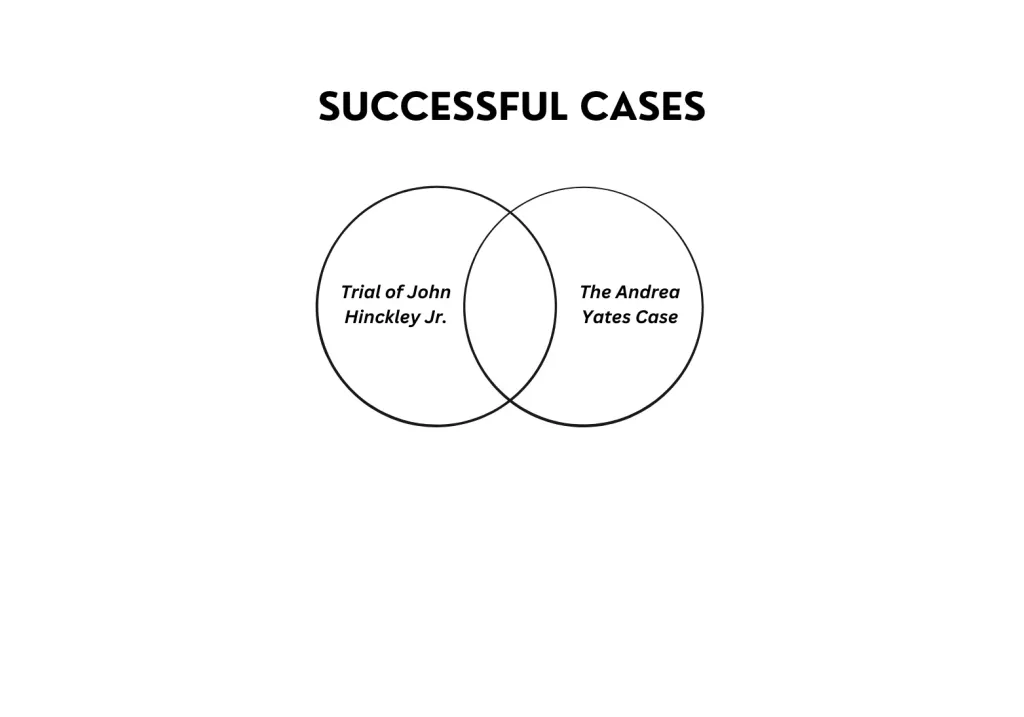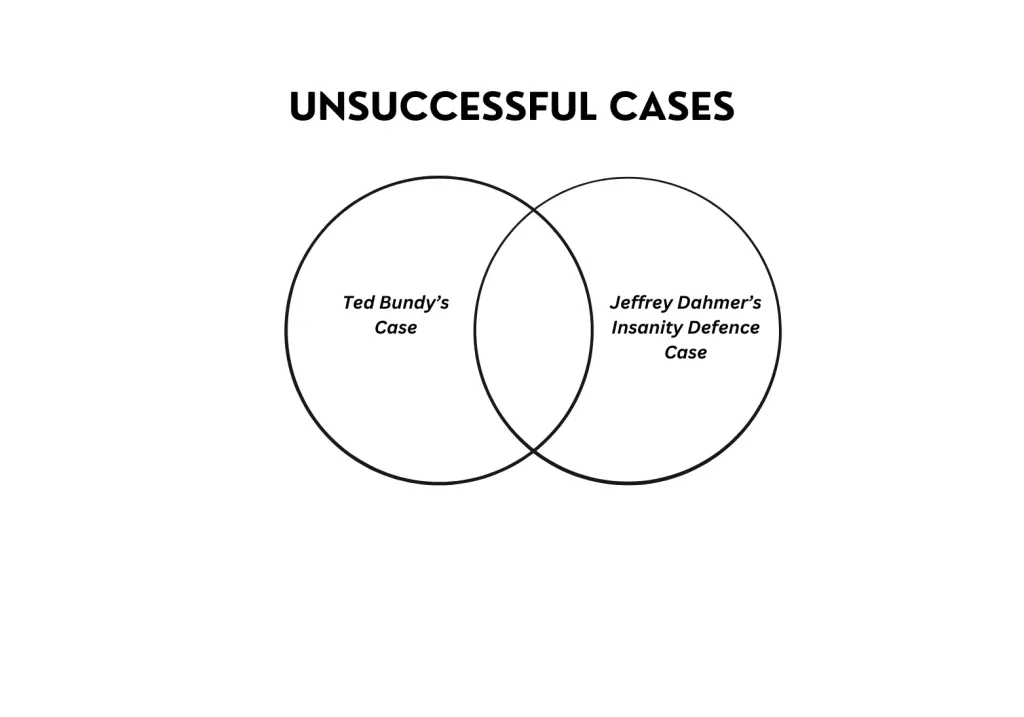The insanity defence has always been a hot topic in court cases. It involves a defendant pleading “not guilty” by reason of mental instability. Insanity refers to poor mental capacity. It restricts your decision-making ability. You cannot make a clear distinction between right and wrong. Expert psychologists provide in-depth mental information on the defendants in legal cases. Read further about some famous insanity defence cases from history.
M’Naghten Rule Defence Case
The M’Naghten’s case was where it all started.
In 1843, Daniel M’Naghten assassinated Edward Drummond, a high-ranking civil servant. During the trial, the jury declared that Daniel was mentally unstable at the time of the crime. After this case, the concept of the insanity defence case emerged.
Other Most Famous Cases of Insanity Defence
After the incident of Daniel, the following high-profile insanity cases arose:
- John Hinckley Jr
- Jeffrey Dahmer
- Ted Bundy
- Andrea Yates Case
Successful cases
Trial of John Hinckley Jr.
On March 30, 1981, John Hinckley attempted to assassinate President Ronald Reagan. In 1982 the verdict declared him “not guilty” by reason of insanity.
The trial’s result sparked public outrage, as they thought the act was done to impress actress Jodie Foster. However, Hinckley’s lawyers argued that he was mentally unstable at the time of the shooting.
The Andrea Yates Case
In 2001, Yates drowned all her 5 children in a bathtub. Police arrested and charged her with capital murder. Yates pleaded not guilty by reason of insanity during the trial. But the court found her guilty and sentenced her to life in prison.
It was later found that a prosecution witness gave false testimony during the trial. This led to a subsequent retrial, eventually resulting in her acquittal in 2006. However, she was immediately hospitalised in a highly secure state mental hospital for rehab.

Unsuccessful case
Ted Bundy’s Case
Ted Bundy’s trail was one of the most famous insanity defence cases in the history. His nefarious killing spree resulted in the death of dozens of young women. His case remained a matter of debate in the media for months.
In January 1976, Bundy was tried in the Utah court for the murder of two college students. He was given a death sentence in 1979.
He then underwent two more trials for other murders in 1980. During his final trial, he ceded control to a defence team. He pleaded not guilty by reason of insanity. But, undeniable legal evidence and witness accounts linking him to all his crimes convinced the jury to maintain the verdict.
Jeffrey Dahmer’s Insanity Defence Case
In 1991, Dahmer’s arrest brought to light his heinous crimes. He killed 17 men and boys over a period of 13 years.
During court proceedings, Dahmer pleaded not guilty by reason of insanity.
But to prove his mental illness, at least 10 jurors needed to agree that he had a problem. However, the jury never reached that point. So, they ruled that he did not suffer from a mental disease.

Conclusion
Having the support of a qualified psychology expert witness can make all the difference in building a solid defence. At Concise Medico, we understand the critical role of expert testimony in an insanity defence case. Our detailed reports outline the mental and psychological states of claimants and defendants.
The insanity defence has always been a hot topic in court cases. It involves a defendant pleading “not guilty” by reason of mental instability. Insanity refers to poor mental capacity. It restricts your decision-making ability. You cannot make a clear distinction between right and wrong. Expert psychologists provide in-depth mental information on the defendants in legal cases. Read further about some famous insanity defence cases from history.
M’Naghten Rule Defence Case
The M’Naghten’s case was where it all started.
In 1843, Daniel M’Naghten assassinated Edward Drummond, a high-ranking civil servant. During the trial, the jury declared that Daniel was mentally unstable at the time of the crime. After this case, the concept of the insanity defence case emerged.
Other Most Famous Cases of Insanity Defence
After the incident of Daniel, the following high-profile insanity cases arose:
- John Hinckley Jr
- Jeffrey Dahmer
- Ted Bundy
- Andrea Yates Case
Successful cases
Trial of John Hinckley Jr.
On March 30, 1981, John Hinckley attempted to assassinate President Ronald Reagan. In 1982 the verdict declared him “not guilty” by reason of insanity.
The trial’s result sparked public outrage, as they thought the act was done to impress actress Jodie Foster. However, Hinckley’s lawyers argued that he was mentally unstable at the time of the shooting.
The Andrea Yates Case
In 2001, Yates drowned all her 5 children in a bathtub. Police arrested and charged her with capital murder. Yates pleaded not guilty by reason of insanity during the trial. But the court found her guilty and sentenced her to life in prison.
It was later found that a prosecution witness gave false testimony during the trial. This led to a subsequent retrial, eventually resulting in her acquittal in 2006. However, she was immediately hospitalised in a highly secure state mental hospital for rehab.

Unsuccessful case
Ted Bundy’s Case
Ted Bundy’s trail was one of the most famous insanity defence cases in the history. His nefarious killing spree resulted in the death of dozens of young women. His case remained a matter of debate in the media for months.
In January 1976, Bundy was tried in the Utah court for the murder of two college students. He was given a death sentence in 1979.
He then underwent two more trials for other murders in 1980. During his final trial, he ceded control to a defence team. He pleaded not guilty by reason of insanity. But, undeniable legal evidence and witness accounts linking him to all his crimes convinced the jury to maintain the verdict.
Jeffrey Dahmer’s Insanity Defence Case
In 1991, Dahmer’s arrest brought to light his heinous crimes. He killed 17 men and boys over a period of 13 years.
During court proceedings, Dahmer pleaded not guilty by reason of insanity.
But to prove his mental illness, at least 10 jurors needed to agree that he had a problem. However, the jury never reached that point. So, they ruled that he did not suffer from a mental disease.

Conclusion
Having the support of a qualified psychology expert witness can make all the difference in building a solid defence. At Concise Medico, we understand the critical role of expert testimony in an insanity defence case. Our detailed reports outline the mental and psychological states of claimants and defendants.




